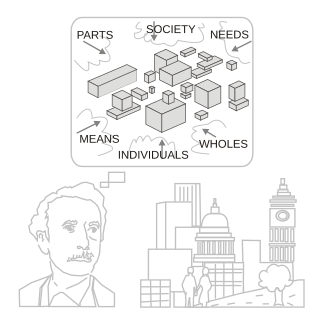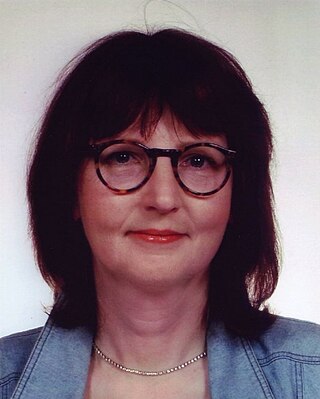Related Research Articles

Systems science, also referred to as systems research, or, simply, systems, is a transdisciplinary field concerned with understanding systems—from simple to complex—in nature, society, cognition, engineering, technology and science itself. The field is diverse, spanning the formal, natural, social, and applied sciences.

In sociology, social complexity is a conceptual framework used in the analysis of society. In the sciences, contemporary definitions of complexity are found in systems theory, wherein the phenomenon being studied has many parts and many possible arrangements of the parts; simultaneously, what is complex and what is simple are relative and change in time.

Computational sociology is a branch of sociology that uses computationally intensive methods to analyze and model social phenomena. Using computer simulations, artificial intelligence, complex statistical methods, and analytic approaches like social network analysis, computational sociology develops and tests theories of complex social processes through bottom-up modeling of social interactions.
Gerard de Zeeuw is a Dutch scientist and Emeritus professor Mathematical modelling of complex social systems at the University of Amsterdam in the Netherlands. He is known for his work on the theory and practice of action research, particularly on the "Problems of increasing competence", "Second order organisational research" and "Three phases of science: A methodological exploration".
Dorothea Jacqueline (Dorien) DeTombe is a Dutch sociologist and former academic at the Utrecht University and the Delft University of Technology, known for her contributions in the field of methodology for societal complexity.
Pieter Johannes Mosterman was Chief Research Scientist and Director of the MathWorks Advanced Research & Technology Office (MARTO) at MathWorks in Natick, Massachusetts. He also holds an Adjunct Professorship at the School of Computer Science at McGill University in Montreal, Canada. His primary research interests are in Computer Automated Multiparadigm Modeling with principal applications in design automation, training systems, and fault detection, isolation, and reconfiguration.
Johannes "Hans" van der Zouwen is a Dutch sociologist, and Emeritus Professor of Social Research Methodology at the Vrije Universiteit in Amsterdam, known for his pioneering work with Felix Geyer in the field of sociocybernetics.

Gideon Jan (Don) Mellenbergh was a Dutch psychologist, who was Professor of Psychological methods at the University of Amsterdam, known for his contribution in the field of psychometrics, and Social Research Methodology.
Roelf Johannes (Roel) Wieringa is a Dutch computer scientist who was a Professor of Information Systems at the University of Twente, specialized in the "integration of formal and informal specification and design techniques".

Johannes Gerard (Jan) Lambooy is a Dutch social geographer and Emeritus professor Economic geography and Urban economics at the University of Amsterdam.
Robert de Hoog is a Dutch social scientist and Emeritus Professor Information and knowledge management at the University of Twente, known for his contributions in the field of scientific modelling.
Willem Egbert (Wim) Saris is a Dutch sociologist and Emeritus Professor of Statistics and Methodology, especially known for his work on "Causal modelling in non-experimental research" and measurement errors.

Johannes Petrus "John" van de Geer was a Dutch psychologist, and Professor of Experimental Psychology at Leiden University, particularly known for his "Introduction to multivariate analysis for the social sciences".
Hermanus Johannes "Herman J." Adèr is a Dutch statistician/methodologist and consultant at the Vrije Universiteit, the VU University Medical Center and the University of Stavanger, known for work on Methodological Modelling and Social Research Methodology.

Josephus Johannes Cornelis Maria (Joop) Hox is a Dutch psychologist and Professor of Social Science Methodology at the Utrecht University, known for his work in the field of social research method such as survey research and multilevel modeling.
Rudolf Felix Geyer is a Dutch sociologist and cybernetician, former head of the methodology section of SISWO at the University of Amsterdam, known for his work in the fields of Social alienation, and on sociocybernetics.

Edith Desiree de Leeuw is a Dutch psychologist, statistician, research methodologist, and professor in survey methodology and survey quality, at the University of Utrecht. She is known for her work in the field of survey research.

Problem structuring methods (PSMs) are a group of techniques used to model or to map the nature or structure of a situation or state of affairs that some people want to change. PSMs are usually used by a group of people in collaboration to create a consensus about, or at least to facilitate negotiations about, what needs to change. Some widely adopted PSMs include
Claudi Bockting is a Dutch clinical psychologist and Professor of Clinical Psychology in Psychiatry at the University of Amsterdams Faculty of Medicine, Amsterdam University Medical Centers. Her research program focuses on identifying etiological factors of common mental health disorders such as depression, anxiety disorders and substance abuse, and developing evidence-based psychotherapeutic interventions.
References
- ↑ Becker, Henk A. "Social impact assessment." European Journal of Operational Research 128.2 (2001): 311-321.
- ↑ Bal, Frans, and Peter Nijkamp. "In search of valid results in a complex economic environment: The potential of meta-analysis and value transfer." European Journal of Operational Research 128.2 (2001): 364-384.
- 1 2 "Cor van Dijkum. Senior researcher" at linkedin.com, 2015
- ↑ EURO Mini-Conference Graz 2013, at eurominiconferencegraz2013.wordpress.com.
- ↑ nosmo.nl/isj/, accessed 06.2015
- ↑ J. A. Boom.. Sociologische gids: Tijdschrift voor sociologie en sociaal onderzoek, Vol. 28 (1982). p. 394.
- ↑ Mens en maatschappij, Vol. 67. N.V. Drukkerij "'T Koggeschip", 1992, p. 87.
- ↑ NOSMO Methodologendag 2008 at nosmo.nl.
- ↑ kwalon.nl
- 1 2 3 C. van Dijkum. "Complexity is more than complicated. Investigating, simulating and handling complexity: a challenge for system dynamics," in: Leopold-Wildburger, Ulrike, et al., eds. Proceedings of the EURO Mini-Conference on Collaborative Decision Systems in Economics and in Complex Societal and Environmental Applications. EWG-DSS, 2013.